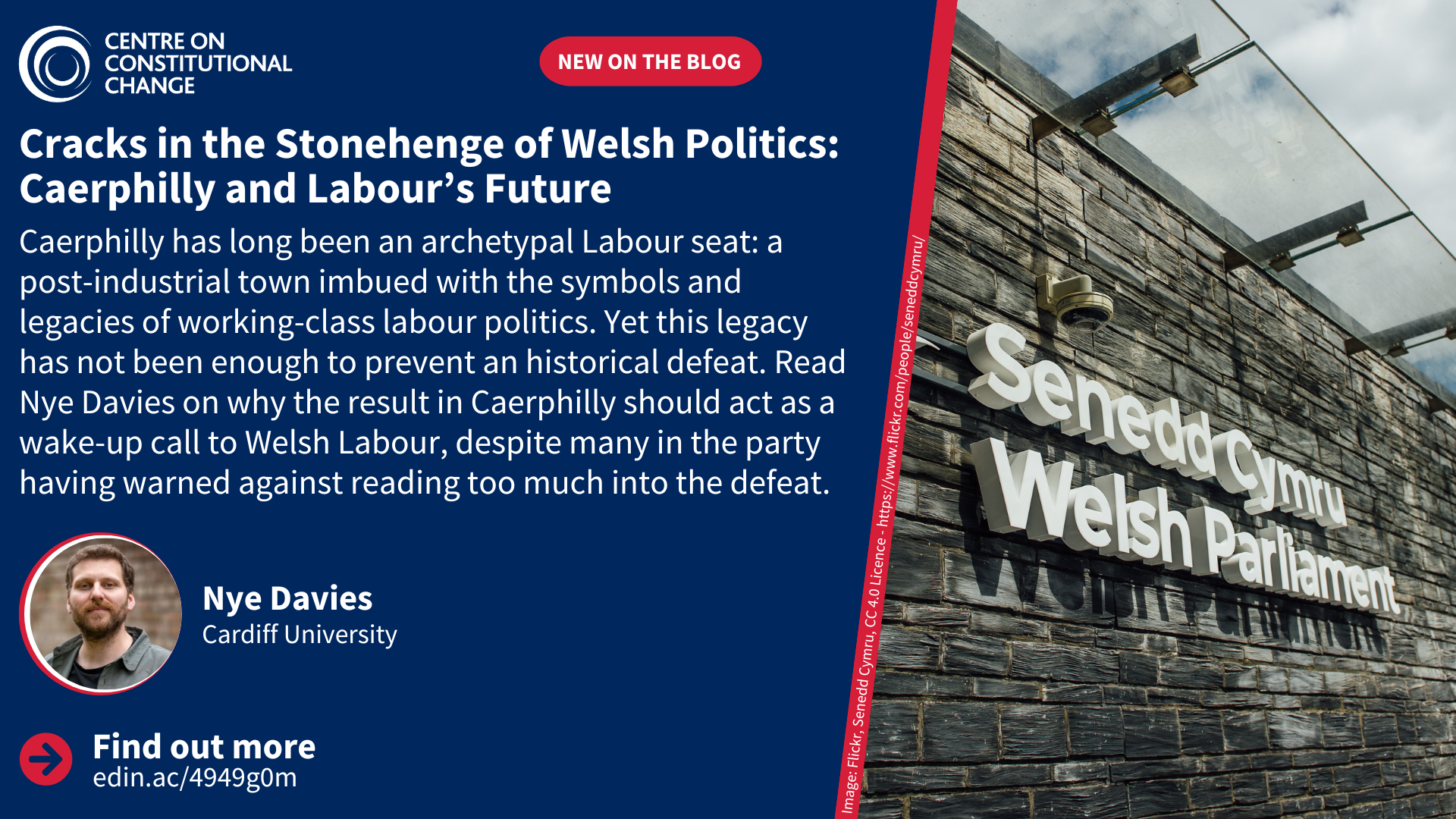Cracks in the Stonehenge of Welsh Politics: Caerphilly and Labour’s Future

By Nye Davies
A bird’s-eye view of the Lansbury Park estate in Caerphilly reveals the Labour Party’s imprint on the town. Named after former party leader George Lansbury, its streets honour Labour stalwarts – Clement Attlee, Philip Snowden, James Maxton, and Vernon Hartshorn – and the estate stands as a physical reminder of the deep-rooted legacy of Labour, not just in Caerphilly but across the south Wales valleys.
Caerphilly has long been an archetypal Labour seat: a post-industrial town imbued with the symbols and legacies of working-class labour politics. Yet this legacy has not been enough to prevent an historical defeat. On Thursday 23 October Welsh Labour lost Caerphilly to Plaid Cymru in a by-election prompted by the death of MS Hefin David.
It could be argued that Caerphilly is following the typical by-election pattern, acting as a rebuke to an unpopular incumbent government. But the scale and context of the defeat suggest deeper problems for Labour in Wales. Labour did not just lose a seat it has held since 1918; it came a distant third, winning only 11 per cent of the vote, a fall of almost 35 per cent. This was not a protest vote, it was a collapse.
Gwyn Alf Williams wrote in 1985 that “Labour’s old majorities stand like Aneurin Bevan’s memorial stones”, looking like the “Stonehenge of Welsh politics.” In Caerphilly, one of those stones has cracked; shifting political weather now threatens more monuments to Welsh Labour’s historic majorities.
Establishing dominance
Over a century of dominance does not come easily, and Welsh Labour has had to work to win the votes of the people of Wales. While helped by a semi-proportional electoral system in Senedd elections, it has strategically crafted a distinct Welsh identity since devolution. From Rhodri Morgan’s 2002 ‘clear red water’ speech to its ‘standing up for Wales’ rhetoric while the Conservatives were in power at Westminster, Welsh Labour has aligned itself with universalist principles and emphasised its Welshness, becoming a soft-nationalist party.
It has been an effective strategy: over two decades of uninterrupted success in Senedd elections, even as Labour faltered elsewhere.
However, when we look at Labour’s record in Wales, we can see the cracks. Struggling public services, coupled with MPs and MSs increasingly at loggerheads, make Welsh Labour’s claims to competence and delivery look increasingly hollow.
In this context, the symbolism of Lansbury Park becomes more revealing. Identified as one of the most deprived estates in Wales, it is a community steeped in the names of Labour giants, yet one that highlights the very limits of the project those names embody. The contrast is clear: a landscape that celebrates Labour’s past while exposing the gap between its historic ambition and its delivery in the present.
Looking ahead
As May’s Senedd election approaches, the result in Caerphilly should act as a wake-up call to Welsh Labour. Yet many Labour figures have warned against reading too much into the defeat, stressing that the outcome was the result of a combination of tactical voting against Reform, mid-term frustration with an incumbent government, a locally popular candidate, and even the dynamics created by polling. This downplaying has been striking. A Welsh Labour candidate for 2026 even stated that they were “more relaxed about the situation than one might first think”, framing the result as a victory for progressives against right-wing populism, and predicting that this anti-populist sentiment will rescue Labour in May. Remarkably, the piece did not mention that Plaid Cymru won the election or appreciate that the progressive vote has found an alternative to Labour.
Evidence should caution against such assessments. Polling consistently puts Plaid neck and neck with Reform, and while the 2026 election will be fought on a proportional representation system, which may make voters feel less inclined to vote tactically, reducing the likelihood of a two-horse race as seen in Caerphilly, it also undermines Labour’s historical structural advantage.
The party faces a challenge on two fronts: in Wales and at Westminster. While Welsh Labour’s message during the 2024 general election was to emphasise two Labour governments working together, it has proved more a case of two Labour governments not working effectively. Alongside Welsh Labour’s internal party disputes and struggling public services in Wales, regular scandals in Starmer’s government and frustration over key policy decisions has seen the party’s popularity suffer.
Welsh Labour’s voting coalition, established and maintained through appeals to both left-leaning voters and Welsh identifiers, appears increasingly fractured and willing to look elsewhere. In Plaid Cymru, it has a clear alternative.
An end to dominance?
It has been said many times, and it is worth repeating, that Welsh Labour should not be written off. A lot can change in six months, and those warning against declaring the death of Welsh Labour might yet prove to be right.
Nevertheless, there is a clear trajectory. Plaid Cymru will be buoyed by the result, demonstrating an ability to mobilise progressive voters at a moment of concern about the prospect of a right-populist government. For Reform, while the party may have expected to win in Caerphilly, its candidates will point to the significant increase in votes as a sign they are a credible force in Wales.
Meanwhile, although Welsh Labour activists and politicians will call for renewal ahead of May, time appears to be against them. Even if a clear vision for the country is articulated, voters will want to see concrete results after so long in power, a difficult task to demonstrate in such a short time.
Maurice Duverger’s observation that the “dominant party wears itself out in office” and “loses its vigour” appears to be prophetic. Less than two years after its landslide UK victory, Labour enters one of the most challenging electoral battles of its century-long Welsh hegemony. After decades of electoral success, Welsh Labour’s dominance could be over in a sudden rupture. Or, as Caerphilly’s own Tommy Cooper would say, it could end – “just like that”.